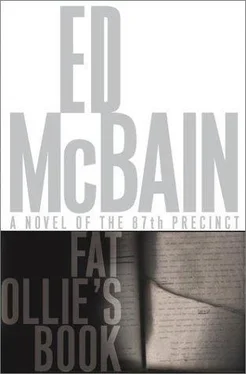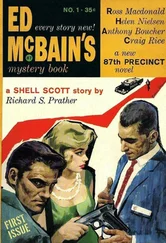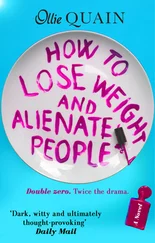Ed McBain - Fat Ollie's Book
Здесь есть возможность читать онлайн «Ed McBain - Fat Ollie's Book» весь текст электронной книги совершенно бесплатно (целиком полную версию без сокращений). В некоторых случаях можно слушать аудио, скачать через торрент в формате fb2 и присутствует краткое содержание. Жанр: Полицейский детектив, на английском языке. Описание произведения, (предисловие) а так же отзывы посетителей доступны на портале библиотеки ЛибКат.
- Название:Fat Ollie's Book
- Автор:
- Жанр:
- Год:неизвестен
- ISBN:нет данных
- Рейтинг книги:4 / 5. Голосов: 1
-
Избранное:Добавить в избранное
- Отзывы:
-
Ваша оценка:
- 80
- 1
- 2
- 3
- 4
- 5
Fat Ollie's Book: краткое содержание, описание и аннотация
Предлагаем к чтению аннотацию, описание, краткое содержание или предисловие (зависит от того, что написал сам автор книги «Fat Ollie's Book»). Если вы не нашли необходимую информацию о книге — напишите в комментариях, мы постараемся отыскать её.
Fat Ollie's Book — читать онлайн бесплатно полную книгу (весь текст) целиком
Ниже представлен текст книги, разбитый по страницам. Система сохранения места последней прочитанной страницы, позволяет с удобством читать онлайн бесплатно книгу «Fat Ollie's Book», без необходимости каждый раз заново искать на чём Вы остановились. Поставьте закладку, и сможете в любой момент перейти на страницу, на которой закончили чтение.
Интервал:
Закладка:
“Or maybe not,” Carella said.
“Or maybe not,” Ollie agreed. “It’s a free country, and nobody’s hassling the man.”
“Except us,” Kling said.
“Asking pertinent questions ain’t hassling. Unless you’re a Negro, of course, and then everybody in the whole fucking world is hassling you. Foster’s been around the block once or twice, so watch your ass, he’s slippery as a wet condom. Then again, they all are. This is where the big bad city begins, Sonny Boy, right here in the Eight-Eight, the home of the jig and the land of the spic.”
“One more time, Ollie,” Kling said.
“What the fuck’s with you?” Ollie said, genuinely puzzled.
“See you at three,” Carella said, and took Kling’s elbow and steered him out of the squadroom.
Behind them, Ollie called, “You new in the job, or what?”
IT OCCURRED TO CARELLAthat it had been raining the last time he’d visited the Reverend Gabriel Foster here at the First Baptist Church. This time he took an umbrella from the car. In this city, you never saw a uniformed cop carrying an umbrella and you hardly ever saw a detective carrying one, either. That was because law enforcement officers could walk between the drops. Walking between the drops now, Carella hunched with Kling under the large black umbrella, and they splashed their way together to the front doors of the church.
The First Bap was housed in a white clapboard structure wedged between a pair of six-story tenements whose red-brick facades had been recently sandblasted. There were sections of Diamondback that long ago had been sucked into the quagmire of hopeless poverty, where any thoughts of gentrification were mere pipe dreams. But St. Sebastian Avenue, here in the Double-Eight between Seventeenth and Twenty-first, was the hub of a thriving mini-community not unlike a self-contained small town. Along this stretch of avenue, you could find good restaurants, markets brimming with prime cuts of meat and fresh produce, clothing stores selling designer labels, repair shops for shoes, bicycles, or umbrellas, a new movie complex with six screens, even a fitness center.
Carella rang the doorbell.
The middle of the three doors opened.
A slight black man wearing a dark suit and glasses peered out at them.
“Come in out of the rain,” he said.
Inside, rain battered the roof of the church, and only the palest light trickled through stained-glass windows. The pews echoed themselves row upon row, silent and empty. Carella closed the umbrella.
“You’re policemen, aren’t you?” the man said.
“Detective Carella,” he said.
“You’ve been here before.”
“Yes.”
“I remember. Did you want to see the Reverend?”
“If he’s here.”
“I’m sure he’ll want to talk to you. I’m Deacon Ainsworth,” he said, and offered his hand.
Both detectives shook hands with him.
“Come with me,” he said, and led them down a side aisle to a door to the right of the altar. The door opened onto a narrow passageway lined with windows on the street side. They walked past the windows to another door at the far end. Ainsworth knocked. A voice within said, “Yes, come in.” Ainsworth opened the door.
According to police records, the Reverend Gabriel Foster’s birth name was Gabriel Foster Jones. He’d changed it to Rhino Jones when he enjoyed a brief career as a heavyweight boxer, and then settled on Gabriel Foster when he began preaching. Foster considered himself a civil rights activist. The police considered him a rabble rouser, an opportunistic self-promoter, and a race racketeer. His church, in fact, was listed in the files as a “sensitive location,” departmental code for anyplace where the uninvited presence of the police might cause a race riot.
Six feet, two inches tall, with the wide shoulders and broad chest of the heavyweight fighter he once had been, his eyebrows still ridged with scar tissue, Foster at the age of forty-nine and fast approaching fifty still looked as if he could knock your average contender on his ass in thirty seconds flat. He extended his right hand the moment the detectives entered the rectory. Grinning, he said, “Detective Carella! Nice to see you again.”
The men shook hands. Carella was mindful of the fact that the last time he was here, Foster hadn’t been at all happy to see him.
“This is Detective Kling,” he said.
“Nice to meet you,” Kling said.
“I know why you’re here,” Foster said. “You’re shaking the tree, am I right?”
“We’re here because the last time you and Henderson debated, it ended in a fist fight,” Carella said.
“Well, that’s not quite true,” Foster said.
“It’s our understanding of what happened.”
“Oh, we came to blows, all right, that part of it is most certainly true,” Foster said, grinning. “It’s the ‘debate’ part I would challenge. I wouldn’t exactly call his diatribe a debate.”
Kling was trying to decide whether he liked the man or not. He had become overly sensitive in his dealings with black people ever since he’d begun living with a black woman. What he tried to do was see all black people through Sharyn’s eyes. In that way, all the color bullshit disappeared. The first thing he’d learned from her was that she despised the label “African-American.” The second thing he’d learned was that she liked to kiss with her eyes open. Sharyn Cooke was a medical doctor and a Deputy Chief in the Police Department, but Kling never saluted her.
He guessed he liked the mischievous gleam in Foster’s eyes. He knew the man was a troublemaker, but sometimes troublemakers were good if they raked up the right kind of trouble. He was wondering how Lester Henderson had managed to survive a fist fight with the man who’d once been Rhino Jones. Henderson’s pictures in this morning’s paper showed him as a slight man with narrow shoulders and the sort of haircut every politician on television sported, a nonpartisan trim that Kling personally called “The Trent Lott Cut.” Weren’t the Reverend Foster’s hamlike fists registered as deadly weapons? Or had he pulled his punches? And when, exactly, had that boxing match taken place, anyway?
Reading his mind, Carella said, “Tell us about that fight, Reverend Foster.”
“Most people call me Gabe,” Foster said. “It was hardly what I’d call a fight, either. A fight is where two people exchange punches with the idea of knocking somebody unconscious. That is what a fight is all about. Or evenkillingthe other person—which I understand might be a sensitive subject at the moment, considering what happened to that S.O.B.” Foster grinned again. “A week ago Sunday, Lester threw a punch at me, which I sidestepped, and I shoved out at him, which caused him to fall on his ass, and that was the end of that. Photo op for all the cameras in town, but no decision.”
“Why’d he punch you, Gabe?” Kling asked.
“He did notpunchme, per se, hetriedto punch me. I saw it coming all the way from North Dakota, and was out of the way before it was even a thought.”
“Why’d hetryto punch you?” Kling asked.
“Are you the brother dating Sharyn Cooke?” Foster said.
“Brother” was not a word Kling might have used. Neither was “dating.”
“What’s that got to do with the price of fish?” he asked.
“Just wondered. I used to know Sharyn’s mother. Cleaning lady up here in Diamondback. She helped around the church every now and then. When I was just starting out.”
“Why’d Henderson try to punch you?” Kling asked. Third time around. Maybe he’d get lucky.
“Gee, I really don’t know,” Foster said. “You think it’s cause I called him a racist pig?”
“Now why’d you go say something like that?” Carella asked. His eyes, his faint smile betrayed the knowledge that Lester Henderson had been called this before, in many variations on the theme, the most recent one from a state senator, who’d called him “Hitler without a mustache.”
Читать дальшеИнтервал:
Закладка:
Похожие книги на «Fat Ollie's Book»
Представляем Вашему вниманию похожие книги на «Fat Ollie's Book» списком для выбора. Мы отобрали схожую по названию и смыслу литературу в надежде предоставить читателям больше вариантов отыскать новые, интересные, ещё непрочитанные произведения.
Обсуждение, отзывы о книге «Fat Ollie's Book» и просто собственные мнения читателей. Оставьте ваши комментарии, напишите, что Вы думаете о произведении, его смысле или главных героях. Укажите что конкретно понравилось, а что нет, и почему Вы так считаете.












